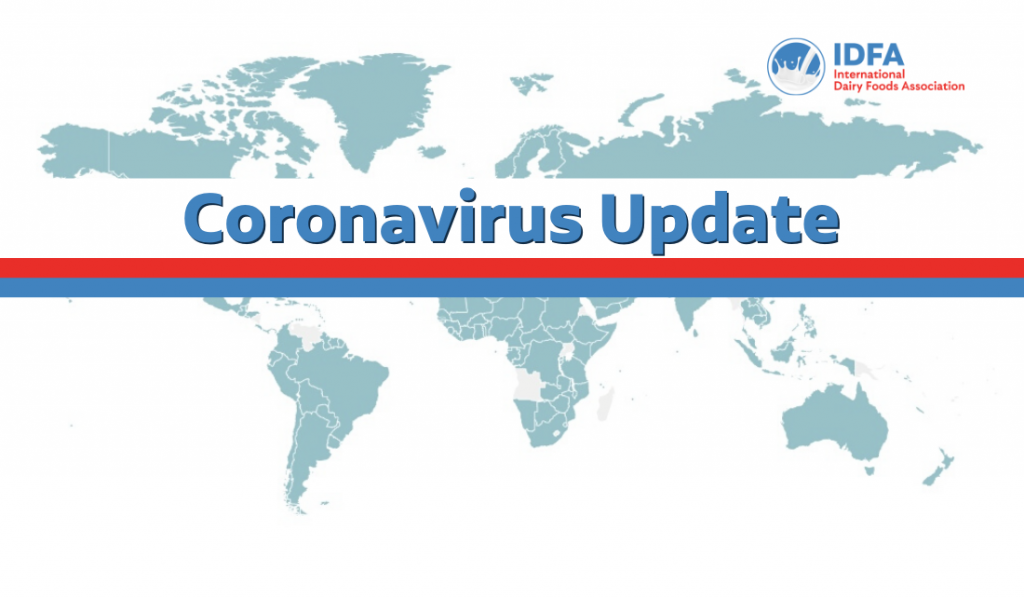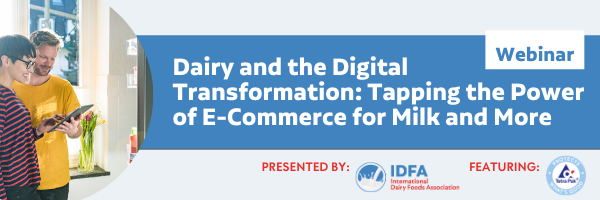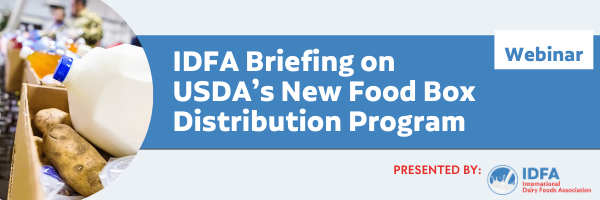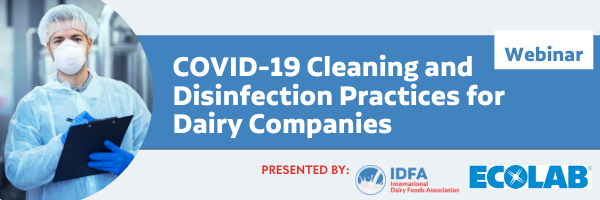Since its discovery in Wuhan, China in late 2019, the novel coronavirus (COVID-19) has reached pandemic status, infecting more than 34 million people and causing more than 600,000 deaths in the United States while inflicting widespread economic devastation. Despite the shuttering of businesses, the distancing of civilians, and other measures taken by governments to mitigate the spread of COVID-19, the dairy industry has persisted as one of the nation's critical industries in producing, processing, packaging, transporting, selling and serving fresh, safe, and nutritious dairy products to the nation and the world. #Essential dairy industry employees continue to perform their important jobs each day.
IDFA members are managing preparedness within their companies and organizations to the best of their ability. IDFA has compiled the following resources related to workforce, supply chains, travel, and other issues, and is communicating daily with the industry at-large to relay best practices, guidance, and other updates related to the crisis.
Below, you'll find these resources, daily updates, and ways to remain informed and engaged. Please email us at coronavirus@idfa.org with any questions, and sign up to receive IDFA communications via the link below.
Jump to:
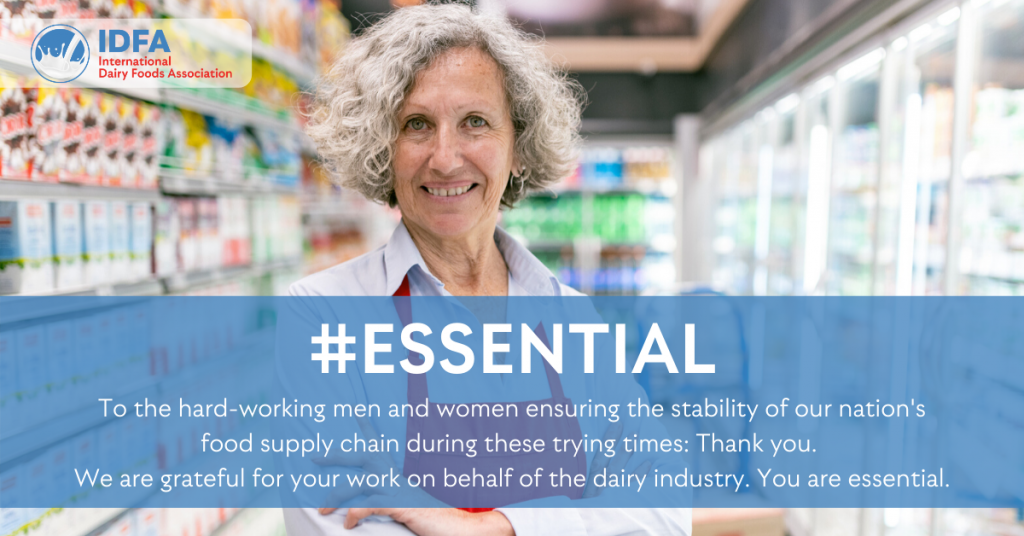
#Essential
IDFA launched the #Essential campaign to recognize and thank the men and women working tirelessly through the Coronavirus outbreak to provide consumers with fresh, safe, nutritious dairy products. Learn more.
Latest Updates
August 6, 2021
IDFA Updates COVID-19 Resource Guide: IDFA has posted current U.S. government vaccination resources and messaging guidance on the IDFA Safety Is Essential page. The U.S. Food and Drug Administration, the U.S. Centers for Disease Control and Prevention and the National Institutes of Health provide useful, reliable and up-to-date public health information guidance. Visit IDFA Safety Is Essential to learn more.
July 27, 2021
On July 27, 2021, CDC announced updated Guidance for COVID-19 Prevention Strategies. Among strategies to prevent COVID-19, CDC recommends all unvaccinated people wear masks in public indoor settings. Based on emerging evidence of the B.1.617.2 (Delta) variant, CDC also recommends that fully vaccinated people wear masks in public indoor settings in areas of substantial or high transmission. To see the level of community transmission in your county, visit COVID Data Tracker.
Archived Updates from 2020 and 2021
- Updates from 2020 and 2021 are archived here: www.idfa.org/coronavirusarchives
What We Know about Coronavirus (COVID-19)
According to the World Health Organization, coronaviruses (CoV or COVID-19) are a large family of viruses that cause illness ranging from the common cold to more severe diseases.
According to CDC and WHO estimates, there are more than 19 million cases worldwide, including more than 4.8 million cases and 160,000 deaths reported in the United States.
IDFA recommends members regularly review the most recent guidance issued by the U.S. Centers for Disease Control and Prevention (CDC) and the World Health Organization (WHO):
- CDC: https://www.cdc.gov/coronavirus/2019-ncov/index.html
- WHO: https://www.who.int/emergencies/diseases/novel-coronavirus-2019
The CDC recommends all Americans wash hands often with soap and water for at least 20 seconds; avoid touching your eyes, nose or mouth with your hands; avoid close contact with people who are sick; and avoid gatherings of 10 or more people.
Guidance to Employers
Preparedness
The CDC instructs all employers to prepare to implement strategies to protect their workforce from COVID-19 while ensuring continuity of operations. During a COVID-19 outbreak, all sick employees should stay home and away from the workplace; respiratory etiquette and hand hygiene should be encouraged; and routine cleaning of commonly touched surfaces should be performed regularly. CDC recommends employers should:
- Ensure the plan is flexible and involve your employees in developing and reviewing your plan.
- Conduct a focused discussion or exercise using your plan, to find out ahead of time whether the plan has gaps or problems that need to be corrected.
- Share your plan with employees and explain what human resources policies, workplace and leave flexibilities, and pay and benefits will be available to them.
- Share best practices with other businesses in your communities (especially those in your supply chain), chambers of commerce, and associations to improve community response efforts.
For companies that want to review or refresh pandemic preparedness plans, the WHO provides the Pandemic Influenza Preparedness and Response manual, free of charge.
FDA & Industry Guidance to Employers
The FDA has issued specific guidance to employers who have questions about what to do when an employee is positive with COVID-19. FDA emphasizes that the primary responsibility of food companies with an infected worker is to take appropriate actions to protect other workers and people who may have come into contact with the ill employee. FDA advises that if an employee in a food processing facility or farm tests positive for COVID-19, facilities should take the following steps to ensure the foods they produce are safe:
- Inform fellow employees of the possible exposure to COVID-19 in the workplace, while maintaining confidentiality;
- Instruct sick employees to follow the CDC’s What to do if you are sick with coronavirus disease 2019 COVID-19 guidance;
- Re-double cleaning and sanitation efforts to control any risks that might be associated with workers who are ill, regardless of the type of virus or bacteria, using EPA-recommended disinfectants;
- Consult with the local health department for additional guidance, including whether to request other workers self-quarantine for 14 days if they have been exposed to the worker who tested positive for COVID-19.
Resources from FDA, CDC, USDA, OSHA, DHS, Industry
- DHS CISA's Essential Critical Infrastructure Workers Guidance, Version 4.0: The Department of Homeland Security's Cybersecurity and Infrastructure Security Agency (CISA) has put together Essential Critical Infrastructure Workers Guidance to provide guidance on how jurisdictions and critical infrastructure owners can use the list to assist in prioritizing the ability of essential workers to work safely while supporting ongoing infrastructure operations across the nation. The guidance was updated on August 20 to reflect the changing landscape of the nation’s COVID-19 response. While earlier versions were primarily intended to help officials and organizations identify essential work functions in order to allow them access to their workplaces during times of community restrictions, Version 4.0 identifies those essential workers that require specialized risk management strategies to ensure that they can work safely. It can also be used to begin planning and preparing for the allocation of scarce resources used to protect essential workers against COVID-19.
- OSHA and FDA Checklist for Protecting Food Industry Employees: The checklist was developed for human and animal food manufacturers to consider when continuing, resuming or reevaluating operations due to the coronavirus pandemic. The checklist is useful for persons growing, harvesting, packing, manufacturing, processing or holding human and animal food regulated by FDA. The checklist includes the following considerations:
- Ensure employee health and a safe workplace;
- Investigate exposure and determine when an employee should be tested for the coronavirus; and
- Configure the work environment to help minimize the risk of spreading the coronavirus among workers.
- Food and Beverage Industry COVID-19 Test Method Factsheet: The purpose of this factsheet is to summarize and simplify for the general food and beverage industry COVID-19 test and testing information provided to the public by CDC, FDA and collected through other knowledgeable sources, based on the authors best understanding. The authors do not intend for this factsheet to constitute medical or legal advice or to serve as a substitute for official U.S. government guidance cited herein. Download the factsheet.
- What To Do When an Employee Tests Positive and Considerations for Identifying Exposed Employees: The following document shares a recommended protocol for the food industry to use when an employee or visitor tests positive or comes into close contact with someone with COVID-19. Review the protocol here.
- During a public health event, public health officials, including epidemiologists, use the term “contact tracing” to describe the process for identifying persons that have may have come into direct contact with an infected person. “Contact tracing” is typically performed in the United States by state and local public health departments using staff that is trained in contact tracing protocols, but employers can assist in this process when employees become infected and there is possible exposure to other employees in the work place. Review guidance here.
- Screening Food Industry Employees for COVID-19 Symptoms or Exposure : As community transmission of COVID-19 is spreading rapidly to other regions, dairy food companies should consider implementing employee screening programs to evaluate staff and visitors for symptoms of COVID-19 or possible exposure prior to entering company facilities. The following guidance discusses factors that companies should consider when deciding if employee/visitor screening is appropriate and how best to implement it. Review guidance here.
- Considerations for Identifying Exposed Employees as Related to COVID-19: During a public health event, public health officials, including epidemiologists, use the term “contact tracing” to describe the process for identifying persons that have may have come into direct contact with an infected person. “Contact tracing” is typically performed in the United States by state and local public health departments using staff that is trained in contact tracing protocols. Review guidance here.
- COVID-19 Employee Symptoms/Testing Status-Based Decision Tool for Food Facilities: This tools for helping to determine testing protocols is based on federal guidance as of April 23, 2020. Review the tool here.
- Physical or Social Distancing Protocol: In order to manage COVID-19 risks to employees, it is critical for food manufacturing facilities to closely review current policies and procedures relative to current knowledge of the risks. The following considerations are based on what we presently know about the virus and are provided to assist companies in reviewing and amending current policies as related to identifying potentially exposed workers so that such workers can be notified and other relevant actions pertaining to the facility, including targeted cleaning, can be taken in a timely manner. Download the protocol.
- FDA Guidance on Use of Respirators, Facemasks, and Cloth Face Coverings in the Food and Agriculture Sector During Coronavirus Disease (COVID-19) Pandemic: Review the guidance here.
- FDA & USDA Fact Sheet for Food and Agriculture: Considerations for Prioritization of PPE, Cloth Face Coverings, Disinfectants, and Sanitation Supplies During the COVID-19 Pandemic: The purpose of this document is to share recommendations for addressing shortages of personal protective equipment (PPE), cloth face coverings,1 disinfectants, and sanitation supplies in the food and agriculture industry in order to help maintain employee safety, continuity of the food supply, food safety, and employee/consumer confidence. Review the factsheet.
- Food Industry Protocol for New Face Covering Guidance from CDC: CDC now recommends, based on new evidence, that everyone should wear a facial covering in public settings, especially in areas of significant community-based transmission. CDC states, "Recent studies found that a significant portion of individuals with coronavirus lack symptoms ('asymptomatic') and that even those who eventually develop symptoms ('pre-symptomatic') can transmit the virus to others before showing symptoms. This means that the virus can spread between people interacting in close proximity - for example, speaking, coughing, or sneezing - even if those people are not exhibiting symptoms.” Please review the food industry's protocol for face coverings.
- FEMA Fact Sheet on Addressing PPE Needs in Non-Healthcare Settings: This guidance summarizes how organizations should consider and manage their personal protective equipment (PPE) needs while ensuring the protection of workers during the coronavirus (COVID-19) pandemic response, including how to preserve limited supplies of PPE, how to consider need during periods of shortages, and how to acquire and request PPE (i.e., in the face of critical shortages and whereas normal supply chain allocation cannot meet operational requirements). Review the FEMA fact sheet.
- Manufacturing Workers and Employers: Interim Guidance from CDC and the Occupational Safety and Health Administration (OSHA): This guidance provides guidance to the manufacturing industry, including food industry, on steps to take to prevent spread of COVID-19 in the workplace. Review the OSHA guidance.
- OSHA Publishes Comprehensive COVID-19 Resources Guide: This document includes listings of COVID-19 resources on workplace safety and health and related topics. It is intended as a resource and includes information on reopening workplaces, industry sector-specific guidance (including food processing and agriculture), and resources by federal agency. Download the Resource Guide.
- OSHA Q&A on Cloth Face Coverings: OSHA generally recommends that employers encourage workers to wear face coverings at work. Face coverings are intended to prevent wearers who have COVID-19 without knowing it (i.e., those who are asymptomatic or pre-symptomatic) from spreading potentially infectious respiratory droplets to others. Read the OSHA Q&A here.
General Guidance on Human Resources, Wages & Benefits
- IDFA Fact Sheet on Loans, Taxes and Wages: IDFA has developed a fact sheet to help members sort through the variety of new guidance, rules and applications for new programs and policies related to actions by Congress to address the COVID-19 crisis. Please download the IDFA Fact Sheet: Guidance on Small Business Loans, Tax Incentives, Benefits to Workers.
- SBA Loan Programs: The Small Business Administration released rules Tuesday for a $349 billion forgivable loan program that is intended to help businesses, including farms and other agricultural employers, all across the country to rehire or retain workers during the COVID-19 crisis. Under the Paycheck Protection Program, businesses with fewer than 500 employees may qualify for a loan up to $10 million based on their eight weeks of prior average payroll, plus an additional 25% of that amount. SBA will forgive the portion of the loan that is used for payroll costs, and loan payments won’t start for six months. The interest rate will be 0.5%. Learn more from SBA.
- SBA Makes Economic Injury Disaster Loans Available to U.S. Agricultural Businesses Impacted by COVID-19 Pandemic: Agricultural businesses are now eligible for SBA’s Economic Injury Disaster Loan (EIDL) and EIDL Advance programs. SBA’s EIDL portal will reopen on May 4, as a result of funding authorized by Congress. To apply, visit SBA. To watch a USDA/SBA webinar on the EIDL program, click here.
- DOL Guidance: The Department of Labor (DOL) provides practical guidance on preventing the spread of COVID-19 and for creating and maintaining safe work practices: Guidance on Preparing Workplaces for COVID-19. The Wage and Hour Division of DOL provides information on common issues employers and employees face when responding to influenza, pandemics, or other public health emergencies: https://www.dol.gov/agencies/whd/pandemic.
- How the Families First Coronavirus Response Act (FFCRA) Supports Workers and Businesses: DOL's Wage and Hour Division announced its first round of published guidance to provide information to employees and employers about how each will be able to take advantage of the protections and relief offered by the Families First Coronavirus Response Act (FFCRA). The new law will be in effect from April 1 to December 31, 2020, applies to businesses with fewer than 500 employees, and provides an exemption for businesses with fewer than 50 employees. The Department will publish more guidance later this week, including more Q&A and a workplace poster. The guidance addresses critical questions, such as how an employer must count the number of their employees to determine coverage; how businesses with fewer than 50 employees can obtain an exemption; how to count hours for part-time employees; and how to calculate the wages employees are entitled to under this law. Please read the Q&A from DOL.
- Sick Leave Guidance: DOL's Wage and Hour Division issued a temporary regulation on April 1, 2020, implementing the new paid sick leave and expanded family medical leave provisions of the Families First Coronavirus Response Act (FFCRA), the COVID-19 financial package passed by Congress in mid-March. The rule is in effect on April 1, 2020. The WHD will post a recorded webinar on Friday, April 3, 2020, to provide a more in-depth description and help them learn more about the FFCRA. To view the new regulation, guidance documents and the webinar, visit https://www.dol.gov/agencies/whd/pandemic.
- OSHA’s Interim COVID-19 Enforcement Response Plan: This Interim Enforcement Response Plan for Coronavirus Disease 2019 (COVID-19) provides instructions and guidance to Area Offices and compliance safety and health officers (CSHOs) for handling COVID-19-related complaints, referrals, and severe illness reports. See the Response Plan.
- Recording of COVID-19 Work-Related Illness Under OSHA's Record-keeping Requirements: Under OSHA’s record-keeping regulation, when an employee contracts an illness the employer must consider if it is “work-related.” An illness is work-related if an event or exposure in the work environment either caused or contributed to the resulting condition or significantly aggravated a pre-existing injury or illness. Starting on May 26, the following guidance will apply and the old policy will be rescinded. Read the OSHA guidance.
- U.S. Equal Employment Opportunity Commission Posts Guidance on ADA, the Rehabilitation Act, and Other EEO Laws: On April 9, EEOC added more technical assistance questions and answers to their website to help employers comply with ADA and other EEO laws in asking disability-related questions and about medical exams. Please see the EEOC guidance.
Labeling & Nutrition Resources & Guidance
- Nutrition Facts Label: Thanks to advocacy from IDFA's Regulatory Affairs team, in collaboration with the Food & Beverage Issue Alliance, FDA announced that it will not enforce use of the new Nutrition Facts labels in 2020. Pending any further guidance from FDA, companies should plan to begin using the new Nutrition Facts Label no later than Jan. 1, 2021. Read the guidance from FDA.
- Selling Food for Foodservice at Retail: For food service businesses and food manufacturers that wish to sell packaged food to consumers directly or to other businesses for sale to consumers, or if retail packaging for certain food products is unavailable, the FDA does not intend to object if the packaged food lacks a Nutrition Facts label, provided that the food does not have any nutrition claims and contains other required information on the label. Please see the FDA guidance.
- Restaurant Menu Labeling: As a result of the COVID-19 pandemic, FDA today released a guidance document, Temporary Policy Regarding Nutrition Labeling of Standard Menu Items in Chain Restaurants and Similar Retail Food Establishments During the COVID-19 Public Health Emergency, to provide temporary flexibility to chain restaurants and similar retail food establishments currently required to provide nutrition information, including calories, on menus and menu boards. Read the FDA guidance.
- Waivers for Serving Varieties of Milk in School Meals & Summer Feeding: USDA is giving states the option to request waivers for a variety of child nutrition programs so local operators can create meals with the foods they have available, including varieties of fluid milk. During the state of emergency with schools closed, schools can operate under different meal pattern rules. Schools operating under the Summer Food Service Program (SFSP) rules can serve any fat level of milk, including whole and 2%, plain and flavored milk. However, schools operating under Seamless Summer Option (SSO) must request a waiver from their state agency to differ from the typical school milk options. To find the waivers or to request a waiver for your state, visit USDA FNS and click on your state.
- USDA Allows Larger Container Sizes in School Meals for Milk, Other Foods & Beverages: In response to the recent proposal from IDFA and NMPF, USDA announced expanded options for serving sizes of milk larger than 8 ounces with school meals operating under Summer Food Service Program. This means that as long as a minimum of 8 ounces of milk is provided with each meal, the milk may be in a larger container. USDA issued a Q&A with greater detail that applies to all child nutrition programs. Read the USDA Q&A here.
- WIC Waivers: The Families First Coronavirus Response Act gives USDA authority to allow states to request a waiver for WIC's supplemental food substitutions requirements. The approval to waive the requirement to adhere to the participant’s specific supplemental food package includes the ability to substitute unavailable WIC supplemental foods for different foods providing the nutritional equivalent of foods prescribed by the Secretary, which could mean substituting 2% milk for 1% or nonfat milk. Processors and retailers will need to contact their respective state WIC directors to urge them to make a waiver request of USDA. To find the state WIC contacts to request a waiver, visit USDA FNS.
- WIC Waivers: To see the WIC waivers that apply to specific states, see this IDFA resource document, IDFA Summary of State WIC Food Package Flexibilities in Response to COVID-19; Allowable Substitutions in effect until May 31, 2020.
- SNAP Waivers: Under the recently enacted Families First Coronavirus Response Act, states may request a waiver from the USDA Food Nutrition Service to take their participating SNAP households up to the national maximum-benefit level. In general, that could mean about an additional $50 per recipient, or $200 for a household of four.
Become an Approved USDA Vendor
To be eligible to submit offers, milk processors must meet the AMS vendor qualification requirements. Deliveries are expected to be to various locations in the U.S. on an FOB destination basis. Bids, modifications, withdrawals of bids, and price adjustments shall be submitted using the Web-Based Supply Chain Management (WBSCM) system. If you have any questions, please reach out to Taylor Boone at IDFA (TBoone@IDFA.org) or Melissa Malcolm-Cullison (MMalcolm@MilkPEP.org). In preparation for these bids, please review all documents as they pertain to this program, including the latest: NEW Master Solicitation (as of October 1, 2019) Economic Price Adjustment Clause (*this bid solicitation will include a monthly economic price adjustment (EPA) to accommodate monthly escalation and reduction of raw milk costs that more closely resembles what is used in the commercial marketplace) Bid Certification Questions Fluid Milk Q&A UPDATED Commodity Requirements Document (CRD) for Fluid Milk Commercial Item Description Fluid Milk Product New Vendor Qualification Requirements and Checklist.
How to Become an Approved Vendor: As only USDA-approved vendors can participate in the bidding process, it is critical for fluid milk processors who are not approved to apply now as the approval process can take several weeks. Potential new vendors can contact the USDA for questions at NewVendor@ams.usda.gov. Milk processors can also contact IDFA and MilkPEP directly for more information. You can also access links to AMS, vendor approval guidance and webinar recordings for more information at MilkPEP.org.
USDA Food Box Distribution Program
- USDA's Food Box Distribution Program Solicitation: USDA has released an RFP for the $3 billion Food Box Distribution Program, which was announced on April 17 by Secretary Perdue. This program is open to food producers, processors, and distributors that will supply food commodities including milk and a variety of dairy products to food banks, schools and non-profit organizations on a mutually agreeable, recurring schedule. Those interested are required to submit proposals by 1 p.m. ET on May 1. Offerers are not required to be approved USDA vendors to submit a proposal. Review the RFP on this page.
- Submit proposals by 1 p.m. ET on May 1, no exceptions
- Recording of USDA AMS Webinar from 4/28 on the Food Box Distribution Program: Zoom meeting recording with David Tuckwiller, Christopher Purdy, Elizabeth Lober, Hilary Cole available on video
- Frequently Asked Questions for the Food Box Distribution Program: https://www.ams.usda.gov/publications/content/request-proposals-frequently-asked-questions
- Watch the IDFA Briefing on the USDA Food Box Distribution Program: IDFA's Michael Dykes and Cary Frye brief members on the new Food Box Distribution Program and RFP process. Watch the webinar and review the slides here.
USDA Dairy Solicitations, Commodity Purchases
May 29, 2020: USDA announced three new bid solicitations funded by the Families First Coronavirus Response Act (FFCRA) and under Section 32 for distribution to various food and nutrition assistance programs. The new bid solicitations include:
The deadline to submit your bid for the following solicitation is Monday, June 8 at 9 a.m. CT / 10 a.m. ET:
- UHT Milk Solicitation: 6,179,120.64 8 oz. units of UHT 1% milk, which will be scheduled for delivery at locations throughout 34 states, Washington, D.C. and Puerto Rico.
The deadline to submit your bids for the following solicitations under Section 32 is Wednesday, June 10 at 1 p.m. CT / 2 p.m. ET:
- Section 32 Solicitation 1: 14,400 half gallons of whole milk, which will be scheduled for delivery at locations throughout Boise, Coeur D’Alene and Twin Falls, Idaho and Brattleboro, Vermont from July 6, 2020 to September 30, 2020.
- Section 32 Solicitation 2: 147,600 gallons of 1% low fat, 2% reduced fat and whole milk and 1,101,600 half gallons of 1% low fat, 2% reduced fat and whole milk, which will be scheduled for delivery at locations throughout 21 states across the U.S. from July 6, 2020 to September 30, 2020.
May 26, 2020: USDA announced a bid solicitation for Mozzarella Cheese funded by the Coronavirus Aid, Relief, and Economic Stability (CARES) Act which compensates farmers for losses due to price declines that occurred between mid-January 2020 and mid-April 2020. USDA’s purchases of cheese will be for delivery to specific locations across the nation for food banks during July 1 through August 31, 2020. The deadline to submit your bids for the new solicitation is Wednesday, June 3 at 9:00 a.m. CT / 10 a.m. ET, which includes:
Food Safety, Safe Operations & Inspections
Food Is Safe: It is important to note that no public health authority has advised of any concern that this illness can be transmitted or has been known to be transmitted via food or drink. The FDA states: Currently there is no evidence of food or packaging being associated with transmission of COVID-19. In fact, a scientific literature review found no scientific evidence of the spread of COVID-19 through food consumption or in association with food packaging. IDFA is confident that dairy foods produced and processed in the United States are safe and wholesome and the system in place to ensure the safety and integrity of dairy foods is working as intended.
- When An Employee Tests Positive: The following document shares a recommended protocol for the food industry to use when an employee or visitor tests positive or comes into close contact with someone with COVID-19. This protocol has been reviewed by the FDA. Download the protocol here.
- New CDC Guidance for Essential Workers Exposed to Coronavirus to Return to Their Jobs: CDC officials now say essential employees, including dairy processing workers, who have been within six feet of a confirmed or suspected case of COVID-19 can go back to work if they are not experiencing symptoms and adhere to the following protocol measures. See the CDC guidelines here.
- FDA Q&A On Preparedness: The FDA has published a Q&A which addresses some questions regarding food and food workers. Please see: https://www.fda.gov/emergency-preparedness-and-response/mcm-issues/coronavirus-disease-2019-covid-19-frequently-asked-questions
- FDA Suspends Supplier Verification Onsite Audits: FDA has issued guidance to communicate the agency's intention to temporarily not enforce supplier verification onsite audit requirements for receiving facilities and importers under the FDA Food Safety Modernization Act (FSMA) in response to the global pandemic of COVID-19.
- FDA Postpones All Domestic Routine Surveillance Facility Inspections: On March 18, FDA announced they have temporarily postponed all domestic routine surveillance facility inspections due to COVID-19. This includes but is not limited to food industry-related inspections. The FDA will continue to conduct domestic for-cause inspections if they are determined to be mission-critical, which includes inspections that are linked to recalls and foodborne illness outbreaks. While FDA typically does not announce when they plan to visit a facility for inspection, for the time being they will pre-announce their arrival for inspections that are conducted. The full FDA statement is here: https://www.fda.gov/news-events/press-announcements/coronavirus-covid-19-update-fda-focuses-safety-regulated-products-while-scaling-back-domestic
- OSHA Guidance: The Occupational Safety and Health Administration (OSHA) provides information for workers and employers, including links to interim guidance and other resources, on preparing workplace for COVID-19: https://www.osha.gov/Publications/OSHA3990.pdf and https://www.osha.gov/SLTC/covid-19/
- EPA Cleaning Guidance: The Environmental Protection Agency (EPA) provides guidance on cleaning and disinfecting agents that can be used to sanitize work places of COVID-19: https://www.epa.gov/pesticide-registration/list-n-disinfectants-use-against-sars-cov-2
- EPA Inspections and Jurisdiction: The EPA will exercise the enforcement discretion specified here for noncompliance covered by this temporary policy and resulting from the COVID-19 pandemic, if regulated entities take the steps applicable to their situations, as set forth in this policy. For noncompliance that occurs during the period of time that this temporary policy is in effect, and that results from the COVID-19 pandemic, this policy will apply to such noncompliance in lieu of an otherwise applicable EPA enforcement response policy. Review the EPA policy memo.
Dairy foods produced and processed in the United States are some of the most highly regulated and safest foods available to consumers. For example, the milk in your glass was tested up to 17 different times before it reached you. Milk and dairy foods must undergo several safety and quality procedures, such as pasteurization, to make sure they are safe and wholesome for you to consume.
With recent food-borne illness outbreaks and questions about the transmission of novel coronavirus (COVID-19), people are concerned about the safety of their food now more than ever. FDA and other regulatory agencies establish processes and protocols that all food must go through to ensure that it is safe for consumers to eat. All milk and dairy products must undergo multiple safety, quality and sanitation tests and procedures on the farm, in transit and at the processing plant to ensure their safety. Preserving the quality and safety of milk begins at the farm and follows through to the refrigerator.
The U.S. government continues to monitor U.S. ports of entry, shipping channels, processing facilities, and the food supply to ensure the safety and integrity of U.S. food and beverages. At this time, there is no heightened concern for the safety of food produced and processed in the United States, including dairy foods. Moreover, the supply of food remains plentiful. The U.S. government, the WHO, as well as the governments of Canada, the EU, and others, recommend consumers adhere to standard, proper food safety practices when handling and preparing all foods. Please see FDA's statement: https://www.fda.gov/news-events/press-announcements/coronavirus-covid-19-supply-chain-update
Transportation & Trucking
Extension of Hours of Service Emergency Declaration: The Federal Motor Carrier Safety Administration’s (FMCSA) has extended their Hours of Service emergency declaration, which was set to expire on December 31, 2020, but is now extended through the end of May 2021. To review the FMCSA extension, click here.
Update on Truck Weight Limits: The $2 trillion CARES Act, signed into law on March 26 by President Trump, included language that allows states to issue permits for trucks to operate at weights over the current 80,000 lb limit. IDFA encourages dairy companies and suppliers to check with the states that are relevant to your company's movement of freight over the highways. Some states may issue a general order lifting weight limits and may not require a permit. Others may be more detailed, lifting limits only to specified levels and for certain types of trucks. Still others will require a permit. If a permit is required, there will be a fee. For a list of state waivers and permitting requirements, visit the Federal Highway Administration, State Oversize/Overweight Load Permit Contacts: https://ops.fhwa.dot.gov/Freight/sw/permit_report/index.htm#obt
Guidance to Truck Drivers Supporting Relief Efforts: To implement the President’s nationwide emergency declaration, the Federal Motor Carrier Safety Administration (FMCSA) expanded its March 13, 2020 emergency regulatory relief declaration from Parts 390-399 to ensure that commercial motor carriers and drivers directly supporting relief efforts can immediately transport essential supplies, equipment and persons, including food, fuel and medical care. The following relief categories relate to the food sector: food, paper products and other groceries for emergency restocking of distribution centers or stores; immediate precursor raw materials, such as paper, plastic or alcohol, that are required and to be used for the manufacture of these items; and fuel. FMCSA released the following Questions and Answers guidance to help companies understand the FMCSA Emergency Declaration of March 19: https://www.fmcsa.dot.gov/emergency/frequently-asked-questions-related-fmcsa-emergency-declaration-03192020
Self-Certification Form: To ensure our dairy industry is able to do its job in service to the nation, IDFA suggests your company use this form to self-certify your employees or shipments as part of the nation's critical infrastructure. Print the form on official company letterhead (your own or that of your transportation provider), print a copy, sign the document where indicated, and ask the employee or driver to keep it on-hand to provide to authorities should they stop individuals or vehicles from carrying out their duties. Download the form here.
On March 20, FDA said that any food company having problems moving food or getting food through areas that have curfews and restrictions because of the coronavirus, should contact the FEMA National Business Emergency Operations Center at NBEOC@fema.dhs.gov. This is a 24/7 operation and they can assist in directing your inquiry to the proper contact.
On March 24, the United States and Canada recognize it is critical we preserve supply chains between both countries. These supply chains ensure that food, fuel, and life-saving medicines reach people on both sides of the border. Supply chains, including trucking, will not be impacted by this new measure, report both governments. Read the joint statement on US-Canada Joint Initiative: Temporary Restriction of Travelers Crossing the US-Canada Land Border for Non-Essential Purposes.
Events & Conferences
The health and welfare of IDFA members and attendees of IDFA events is our most important consideration. IDFA is closely monitoring the potential impact on travel related to coronavirus (COVID-19) and will provide updates as necessary. At this time, the CDC and local and state public health officials have advised individuals to avoid gatherings of more than 10 people. Additionally, many U.S. states and municipalities have declared states of emergency or stay-at-home orders, preventing travel and movement for anything other than essential purposes.
On March 13, IDFA announced that we are postponing the Ice Cream Technology and Yogurt & Cultured Innovation conferences scheduled for March 31 – April 1 at the Miami Marriott Biscayne Bay in Miami, Fla. IDFA is working with the hotel property to determine a suitable date to reschedule the events, and as soon as we have these details, we will communicate them directly to members and participants. IDFA is grateful for your understanding as it works to ensure your health and safety.
On April 1, IDFA announced that we are moving the Regulatory RoundUp event scheduled for June 9-10 at the Wink Hotel in Washington, DC, to a webinar event rather than an in-person event. IDFA will provide additional details for registration soon. IDFA is grateful for your understanding as it works to ensure your health and safety.
We encourage all travelers to use safe travel practices as shared by the CDC: https://www.cdc.gov/coronavirus/2019-ncov/travelers/faqs.html
For future IDFA-hosted events, IDFA is working with our hotels to increase cleaning of public areas including elevator buttons, railings, door handles, public bathrooms, etc., for our guests and conference attendees. Additionally, sanitizing and disinfecting products will be made available for hotel guests and conference attendee at IDFA-hosted events.
IDFA will update guests and attendees of IDFA-hosted events about any disruptions in travel should they occur.
Travel Guidance & Restrictions
IDFA recommends that companies align with guidance from the WHO and CDC, as well as local governments, on travel restrictions and other guidance to help keep our people and our communities safe and healthy. In some cases, companies may decide to use tighter restrictions based on risks to the business and supply chains. Many companies are assessing or implementing contingency plans, including engaging backup suppliers/carriers where necessary, and IDFA encourages you take these steps.
Travel: Frequently Asked Questions by the CDC: https://www.cdc.gov/coronavirus/2019-ncov/travelers/faqs.html
The United States has limited non-essential travel to Canada.
Industry Sign-On Letters to Congress, Administration
As part of IDFA's advocacy on behalf of the dairy industry, we sometimes co-sign letters with other trade associations, organizations, and coalition partners to demonstrate unity on an issue and to push for changes that are in the best interest of our members and the dairy industry. Here are the letters we've signed to Members of Congress and the Administration related to the COVID-19 outbreak.
- January 8, 2021: IDFA and 14 Trade Associations Request President-Elect Designate a Federal Coronavirus Vaccine Coordinator in Each of the 50 States and Territories
- December 1: IDFA and Industry Partners Urge Congress to Pass New PPP Relief
- November 19: IDFA and Food/Ag/Retail Groups Offer Partnership to Incoming Biden Administration
- November 17: IDFA and Other Groups Press SBA to Discontinue PPP Loan Review Questionnaire
- November 11: Industry Sign-On Letter to President on Vaccine Coordination Strategy
- July 29: Coalition Support Letter - SAFE TO WORK Act
- July 20: Food Industry Letter on the Get America Back to Work Act of 2020 to address liability during the COVID-19 pandemic
- May 4: Food Industry Letter to Vice President Pence Requesting Testing Prioritization
- May 3: IDFA Joins with Coalition Calling on Congress to Enact Targeted Liability Protections for Businesses
- April 15: IDFA Joins with Coalition to Request Additional Funding for Paycheck Protection Program
- April 10: Food Industry Sends Letter to President Trump on Essential Worker Compensation
- April 6, 2020: Read the joint IDFA-NMPF Milk Crisis Plan for USDA
- April 3, 2020: IDFA and Coalition of 17 Food Industry Associations Request Federal Aid for Critical Food Industry Employees
- March 25, 2020: Request for Uniform Definitions of 'Critical Infrastructure Industries' from Federal, State and Local Governments
- March 24, 2020: Food & Beverage Issue Alliance: Request for Label Flexibility During the COVID-19 Crisis
- March 23, 2020: Food & Beverage Issue Alliance: Request For 120 Day Extensions for FDA Regulations, Guidance Documents, and Federal Register Notices with Open Comment Periods
- - Please watch this space for updates. - -

